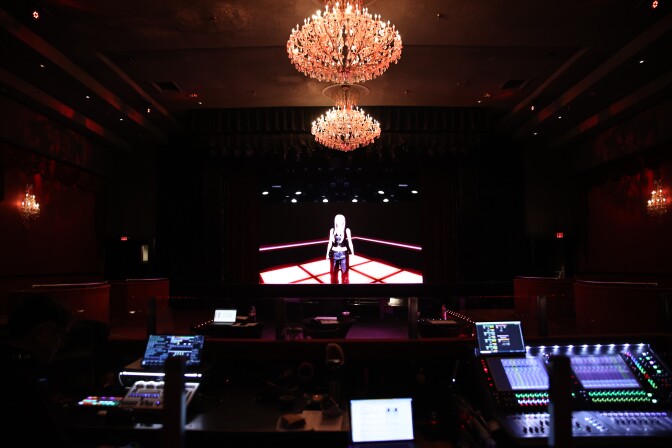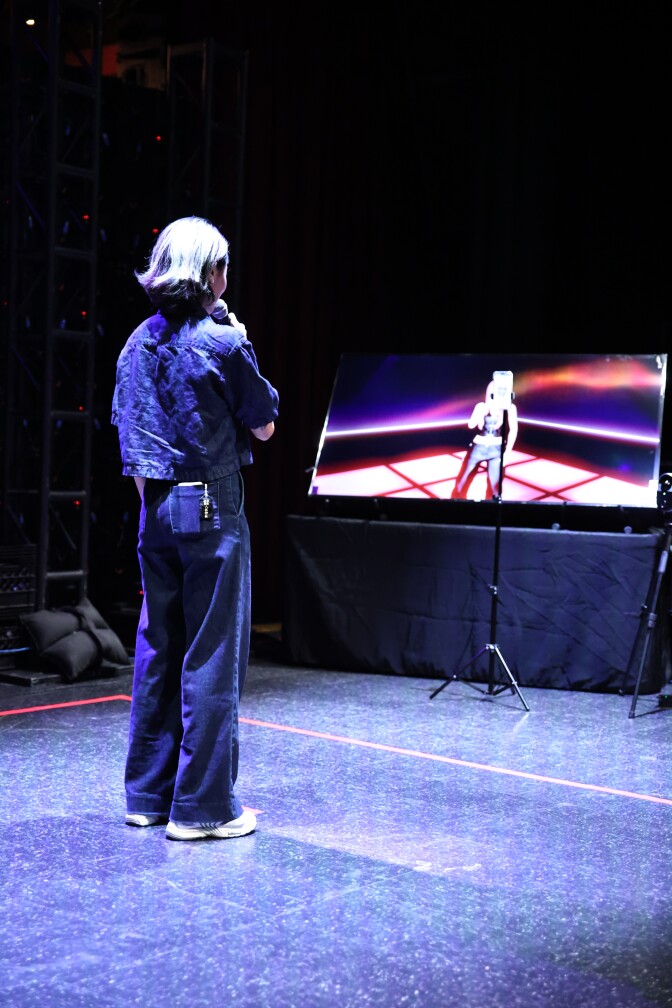This story is free to read because readers choose to support LAist. If you find value in independent local reporting, make a donation to power our newsroom today.
I was at an audition to cast a virtual K-pop idol — and was kinda blown away

In three short decades, K-pop went from being pop songs made and listened to in South Korea to a globally consumed music — thanks in no small part to its knack for constant reinvention.
If the wild success of KPop Demon Hunters is any indication, the genre in its latest evolution has continued its cultural hold.
The Netflix animated film follows a K-pop girl group that also hunts demons. Said demons are disguised as their biggest rivals, a K-pop boy group. The movie has launched hit songs and the careers of the actors and singers who voice these fictional characters.

Virtual K-pop star audition
All that brings us to the El Rey in Mid-Wilshire last week, where K-pop agency Galaxy Corporation held an audition for its first virtual K-pop group. The venue, on this sleepy weekday afternoon, is hollow and quiet — save for three tables set up for judges in front of a giant screen that takes up the entire stage. On the screen is an avatar that bears a slight resemblance to Blackpink rapper Lisa.
Right now, she's just standing there, suspended in an odd inertia.
The publicity person tells me that's the virtual character the auditionees will bring to life. He then takes me backstage, where a motion-capture camera is set up to film the real people singing, dancing and rapping — animating the ginormous girl-vatar onscreen. (There's a boy-vatar, too.)

Test your skills
Auditions are an integral part of the talent pipeline for K-pop, with tryouts held both in South Korea and abroad, drawing throngs of hopefuls. To earn a shot to become a real-life K-pop trainee, participants are judged in a variety of skills — dancing, singing, rapping and modeling, among them.
Do the same standards apply to auditions for virtual acts?
"What makes us so different from other audition programs is that we have no age, no genre, no gender, meaning the participants can do anything they want," Gyuhyuk Song of Galaxy Corporation said through an interpreter.
"Dance, rap, vocal," Song continued, "if they're good at it, they're more than welcome to portray it."

The ubiquity of KPop Demon Hunters aside, virtual K-pop idols are not new. The girl group Aespa debuted in 2020, along with companion virtual avatars called æ. Three years later, the 2D boyband PLAVE came onto the scene — using motion-capture technology to power their singing and dancing. Also in 2023, MAVE made its entrance — a 3D CGI girl group created using AI.
As this incarnation of K-pop takes hold, it isn't so surprising to see companies like Galaxy casting for the next big thing.
But is it different to judge someone through an avatar?
"When I see a participant, I could usually tell within the first two to three seconds if this participant can have a future or not," said Song, who's been in K-pop for over a decade, including at the pioneering SM Entertainment. "Even virtual."
Without further ado
Soon, Song and the two other judges take their seats in front of the stage.
Next, a group of five people shuffles awkwardly toward the back of the stage — each holding a giant umbrella that covered everything except their shoes. The PR person said that's done so the judges won't be influenced by the contestants' looks.
Then the music starts — a song by the Fugees. The avatar on screen kicks into life as singing commences; her hand rises as her voice hangs a high note.
Slowly, I am making the connection between what's happening backstage and what I am seeing on screen. The movements are fluid, no lag — natural beyond virtual. When the hair of the girl avatar undulates, it looks great.
The music fades. That's the cue to end the performance.

Organizers said about 100 contestants showed up at the El Rey, from Los Angeles and as far away as South Korea and Germany, according to the company.
I stuck around for a half-dozen more auditions — watched people rap, dance, sing in all sorts of ways — acapella, playing a guitar and more.
Then it hit me — there are differences among the various performances. The voice, of course, also nuances like quivering eyelids or slight facial expressions that communicate a range of emotions from bliss to heartache.
It wasn't the technology that made it happen. It was the person behind it, performing.











